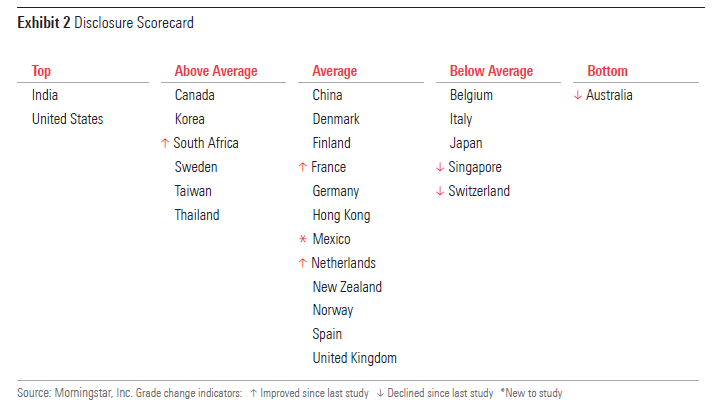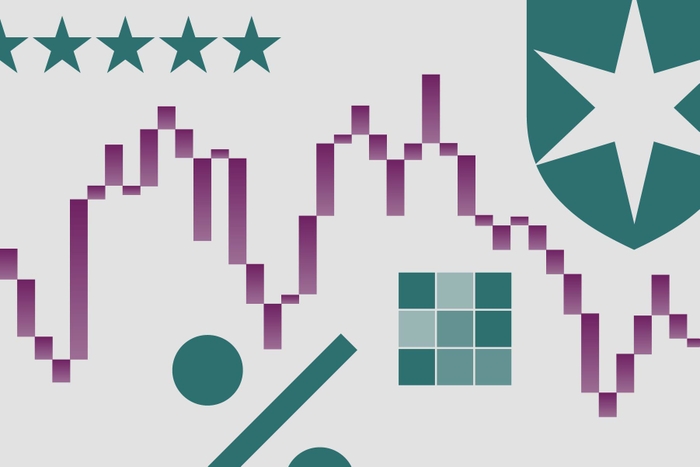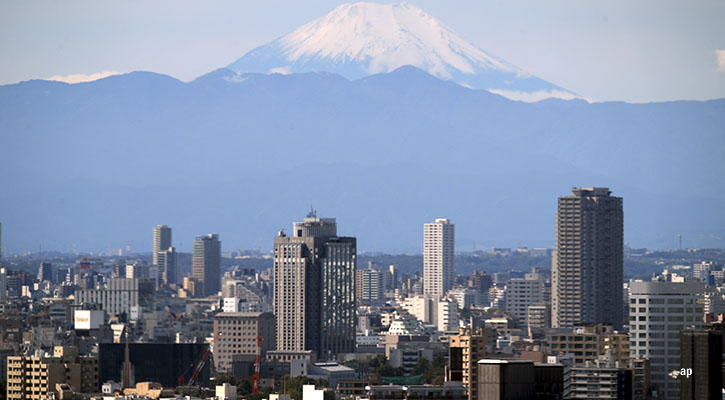
The latest chapter of Morningstar's sixth Global Investor Experience study found that Chinese and Hong Kong investors continue to experience middle-of-the road disclosure environments.
Earlier today, Morningstar published the third and final chapter of its sixth biennial GIE report. This chapter covers Disclosure, grading the experiences of mutual fund investors in 26 markets on a five-tier scale: Top, Above Average, Average, Below Average, and Bottom. Previous chapters were on Fees and Expenses and Regulation and Taxation.
From Morningstar's perspective, the best regulatory approach is rooted in greater transparency. "In the long run, mutual fund industry stakeholders that fight transparency are likely to generate outcomes that are bad for investors and bad for the industry itself. Hence, we are pleased with the incremental improvements most markets have made in improving disclosure practices since our previous study," the report's authors note.
First, here's a look at how countries scored:
The United States and India earned Top grades, with six markets—Canada, Korea, South Africa, Sweden, Taiwan, and Thailand—getting Above Average grades. While most markets occupy roughly similar positions as in the 2017 survey, France and the Netherlands took jumps upward, benefiting from incremental improvements across EU markets, and South Africa's grade also improved.
As in previous years, Australia was awarded the lowest grade. In this edition of the study, Australia stands alone as having clearly the feeblest disclosure regime among the 26 markets in this study. As an otherwise sophisticated market, it is remarkable that Australia remains the only one with no implemented portfolio holdings disclosure regime.
Global Key Findings
The report finds that most markets around the world have incrementally improved the environment for mutual fund investors through better disclosure practices. Ideally, complete portfolio holdings are publicly available from a central website (such as an industry association or a regulator). Pleasingly, nine markets in this study have this in place.
Worldwide, the authors note, much environmental, social, and governance regulation is in the pipeline that should provide more-standardised disclosure to inform investors' understanding and comparison of products. "This should help prevent greenwashing—or using ESG claims in fund marketing without ESG principles truly guiding investment decisions—from being a significant issue for investors," the report notes. "In Europe, which is the region with the most ESG investment regulatory innovation, Sweden is the leader in ESG disclosures, given its granular regulatory requirements. Outside of Europe, the list of green funds disclosed on the Hong Kong regulator website is an example of a simple yet impactful initiative that helps investors more easily identify funds that meet stated ESG requirements."
China
The report awarded China a Disclosure grade of Average.
According to the report, "China requires quarterly shareholder reports, and there are specific requirements around management's discussion of performance that makes it useful for investors. Portfolio manager disclosure is also strong, requiring fund manager names, tenure, and ownership. However, there is no monetary illustration of fees in fund literature, and China is one of only two markets in this study to not publish a simple, aggregated total cost metric for investors."
There have been improvements made on fund disclosure in China since the 2017 survey. Funds are now required to publish a product fact statement instead of the simplified prospectus to communicate key information such as objectives, fees, strategies, and risks to investors. The amendment also encourages asset managers to make additional disclosures such as monthly fact sheets on a voluntary basis, and such disclosures must be fair and not misleading. In addition, an enhanced regulation on fund distribution came into effect in October 2020 that requires intermediaries to disclose trailer fees to investors in writing.
Hong Kong
Hong Kong also received a Disclosure grade of Average.
"Hong Kong's simplified prospectus receives credit for clearly outlining a fund's strategy and investment risks and for requiring standardised returns," the authors write.
But this market does not require the disclosure of manager names and lacks a monetary illustration of fees. Hong Kong requires semiannual portfolio disclosure, but in practice the disclosure of fund portfolios—which in other markets tends to exceed the statutory requirement—falls short relative to other markets in its frequency and timeliness.
Hong Kong has made positive strides in improving disclosure requirements since the 2017 study.
"Notably, distributors are now required to make a one-off disclosure to investors at the point of sale regarding the maximum percentage of management fees received from the product issuer as trailer fees, which helps investors better compare fees charged by different distributors," the report states. "Elsewhere, Hong Kong is leading the way in Asia by introducing a standardised disclosure framework for green or environmental, social, and governance funds to enhance the comparability among such products, and further ESG-specific disclosure requirements are expected."
Morningstar launched the Global Investor Experience study in 2009 to encourage a dialogue about global best practices for mutual funds from the perspective of fund shareholders.










.png)









